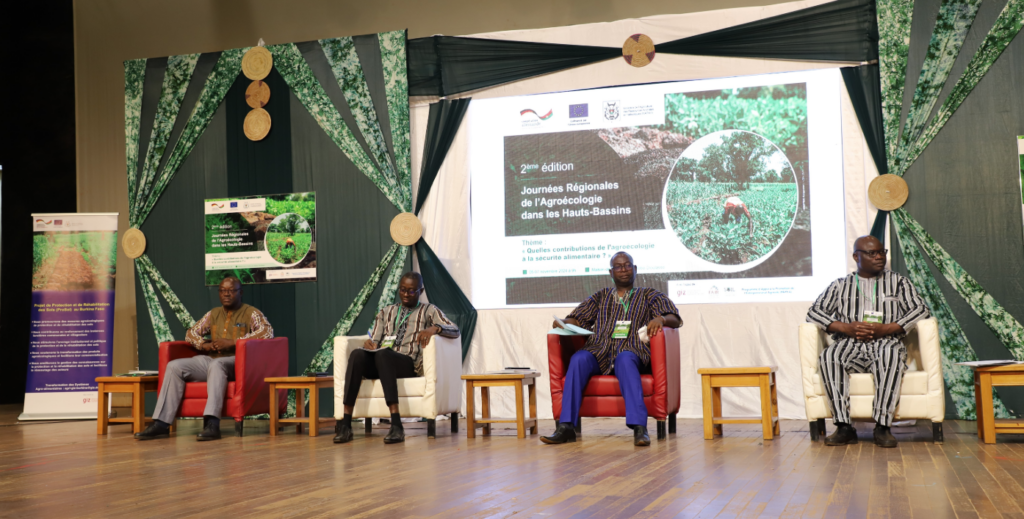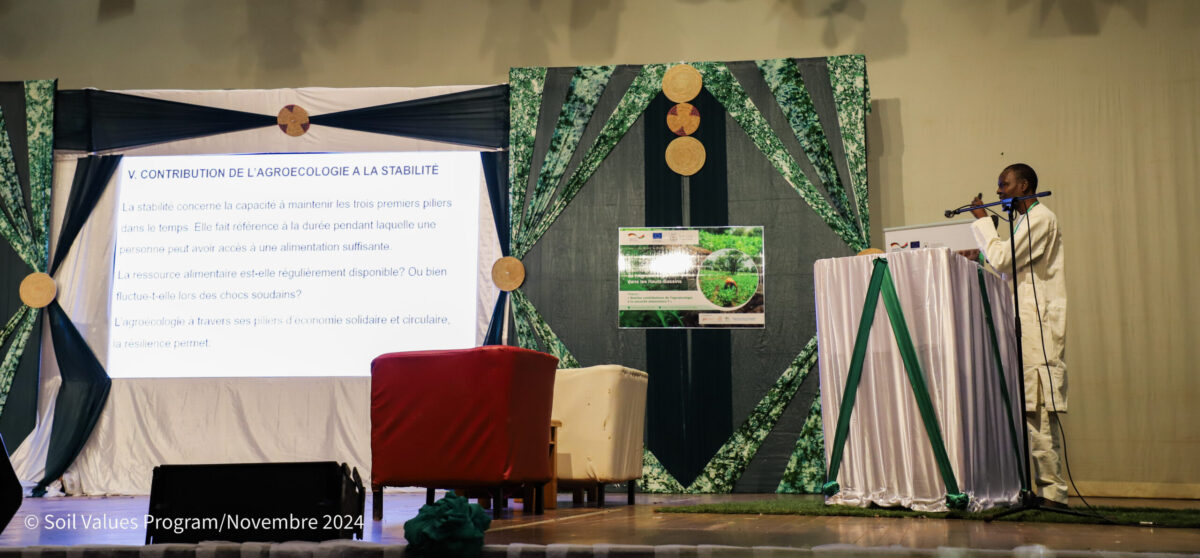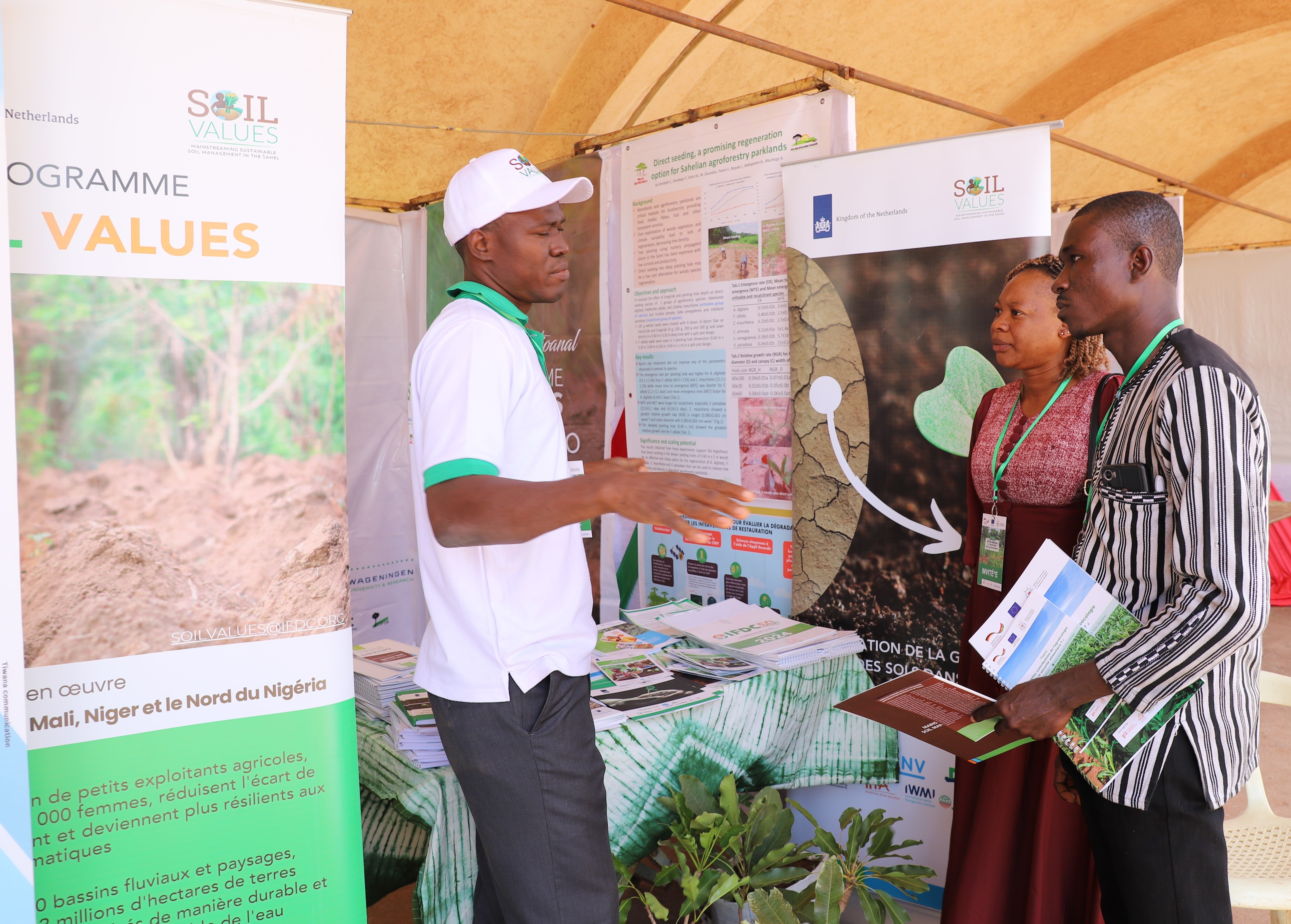
The Soil Values program participated in the second edition of the Regional Agroecology Days of the Hauts-Bassins (JRAE) organized by the Hauts-Bassins Regional Directorate of Agriculture, Animal Resources, and Fisheries (DRARAH), held November 5‑7, 2024, in Bobo-Dioulasso, Burkina Faso, addressing the theme “What contribution does agroecology make to food security?”
Stakeholders from the Hauts-Bassins region, including farmers, researchers, government officials, and representatives of the Ministry of Agriculture, convened at this event to exchange knowledge on agroecological practices.
Agricultural land in Burkina Faso is experiencing an advanced level of degradation. Since agroecology can help improve degraded soil and manage existing agricultural land, Burkina Faso has adopted the National Strategy for the Development of Agroecology (SNDA) for the period 2023-2027, and in 2023, launched the Agropastoral and Fisheries Offensive (OAPH), which aims to increase agricultural production while integrating sustainable practices. The JRAE event reflected the contributions of these agricultural policies and provided a platform to share knowledge and experiences on agroecological practices.
Restoration of Degraded Agroforestry Parks to Support Agroecology
During her keynote at the JRAE event, Dr. Catherine Dembélé, Tree Specialist of the Center for the International Forestry Research and World Agroforestry (CIFOR-ICRAF) and knowledge partner of Soil Values, addressed the issue of restoring degraded agroforestry parks to support the agroecological transition in Burkina Faso, emphasizing the important role of agroforestry. Agroforestry systems, which integrate trees and shrubs, play a key role in soil health. Agroforestry practices offer several benefits, such as erosion reduction, improvement in water retention, stimulation of soil biological processes, and carbon sequestration.

“Let’s restore degraded agroforestry parks to support the agroecological transition in Burkina Faso”
Dr. Catherine Dembélé, Tree Specialist of the Center for International Forestry Research and World Agroforestry (CIFOR-ICRAF)
By combining these systems with other practices, such as utilizing cover crops and nutrient management, farmers can ensure better protection to their soils and maintain stable yields, even in the face of climate challenges. According to Dr. Dembélé, while agroforestry is not the only method for maintaining healthy soil, it is a major asset in the fight against soil degradation and contributes significantly to food security. “Let’s restore degraded agroforestry parks to support the agroecological transition in Burkina Faso,” she shared.
Agroecological Technologies Presented to Agricultural Stakeholders
At the Soil Values booth, numerous agricultural stakeholders engaged in discussions and explored the program’s agroecological approach, which prioritizes the practices of small-scale food producers within their landscapes. Bedeme Bayoulou, Soil Values Field Coordinator in Burkina Faso, highlighted the program’s strong emphasis on Integrated Soil Fertility Management (ISFM) and its role in enhancing soil health and productivity.

These exchanges provided a platform to introduce stakeholders to innovative agroecological technologies and methods developed by the Soil Values coalition, consortium members, and knowledge partners, including IFDC (program lead), SNV, and CIFOR-ICRAF. Among the featured innovations were fertilizers, nurseries, grafting techniques for non-timber forest trees, and biodigesters, showcasing diverse solutions for sustainable agricultural development.
Support for Burkina Faso in Its Agroecological Transition
The JRAE event was made possible through the technical and financial support of key partners, including the Deutsche Gesellschaft für Internationale Zusammenarbeit GmbH (GIZ) through its Soil Protection and Rehabilitation for Food Security (ProSol) program, the French Agricultural Research Centre for International Development (CIRAD) through its FAIR Sahel project, and IFDC through its Soil Values program.
In his address, Éric Pascal Adanabou, Regional Director of Agriculture for Hauts-Bassins, expressed gratitude to these partners for their dedication, resources, and contributions toward advancing agroecological practices in Burkina Faso. In turn, partners highlighted the importance of supporting agroecology and agroforestry. Andréa Schalla, ProSol Project Manager, underscored the need to promote agroecological practices tailored to local conditions and climate challenges, emphasizing their role in strengthening food security, improving public health, and supporting livestock farming.

Rewarding the Best Agroecological Producers in the Hauts-Bassins Region
Several months before the event, a competition was organized by partners of the event to reward producers practicing agroecology in the provinces of Tuy and Houet, covering a total of nine municipalities. This competition highlighted the best producers in sectors such as cowpea, soybean, peanut, and others. A total of 60 producers from the Houet Province applied, and 54 from the Tuy Province applied.
A commission carried out site visits to evaluate agroecological practices. Following the evaluations, four best producers per municipality were chosen. This made it possible to reward a total of 36 agroecological farmers, including 18 women, who will be considered by the Soil Values Program as model producers for whom technology demonstration plots will be set up.
Winning producer Léontine Bondé expressed her satisfaction and stated that this prize allows her to obtain an agricultural equipment kit to strengthen her agricultural activity.
The Soil Values program’s engagement at the 2024 JRAE event reinforced its commitment to supporting Burkina Faso’s agroforestry initiatives for sustainable land management and soil restoration. By actively contributing to discussions and knowledge sharing, the program played a vital role in advancing solutions for healthier soils and more resilient agricultural systems.
Funded by the Dutch Directorate-General for International Cooperation (DGIS), the Soil Values program is being implemented over 10 years (2024-2033), led by the International Fertilizer Development Center (IFDC), in consortium with SNV and Wageningen University and Research (WUR), as well as knowledge partners such as AGRA, the Center for International Forestry Research and World Agroforestry (CIFOR-ICRAF), the International Institute of Tropical Agriculture (IITA), ISRIC – World Soil Information, and the International Water Management Institute (IWMI).




